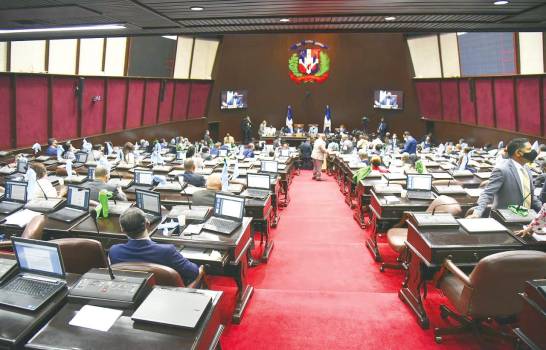
The Chamber of Deputies announced on Wednesday, 25 March 2021, it will resume the reading of the amendments incorporated in the Penal Code next Monday, 5 April 2021 at 2pm. The first reading covered from Art. 1 to 76 and passed in the Chamber of Deputies. The deputies are reading 75-100 articles a day to reach the 412 articles of the Penal Code.
Chamber of Deputies president Alfredo Pacheco established that the articles will be read during the sessions and afterwards the dissenting reports will be read. Then the floor will open to debates and the vote on both reports.
Subsequently, a vote will be taken on the bill, which must be approved in two readings for it to move on to the Senate. The Senate will repeat the same procedure. If the bill is modified in the Senate, it will need to return to the Chamber of Deputies for an additional reading.
The Chamber of Deputies included a first ground for abortion in the Penal Code draft. The exception is for when the life of the mother is in danger.
Article 112 reads: “The termination of pregnancy practiced by specialized medical personnel in public and private health establishments is not punishable if, in advance to save the lives of the mother and the fetus in danger, all available scientific and technical means are exhausted to the extent possible. In such circumstances, the actions taken will be considered as a justified state of necessity.”
The Penal Code establishes that in general, abortion will be punishable with up to three years in prison, and in the event that the woman loses her life, the practitioners will be sentenced to four to ten years in prison. Yet, the new Penal Code also establishes that abortion in general be considered a “crime of humanity” and be subject to jail sentences of 30-40 years.
Four deputies of the 15 that were part of the Justice Committee that presented the Penal Code draft did not sign on to the draft of the bill. These were Eugenio Cedeño, Víctor Manuel Fadul Lantigua, Santiago Vilorio Lizardo y José Horario Rodríguez Grullón. Of these, the later two, Rodríguez and Santiago Vilorio Lizardo presented a dissident opinion.
Jose Horacio Rodríguez said he expects President Luis Abinader to veto the Penal Code if passed without the three grounds for abortion that are accepted in 196 countries around the world. In the past, it was vetoed by past Presidents Leonel Fernandez and Danilo Medina. The Dominican Republic is one of five countries that do not accept the grounds.
Aside from the abortion issue, the amendments to the Penal Code incorporate many innovations and new crimes. Among the proposed changes is the possibility of accumulating sentences. This would create a maximum sentence of 60 years, comparative to the present maximum sentence of 30 years.
The Chamber of Deputies shared in its Tweeter account the new crimes that are being incorporated in the Penal Code. Among these are:
Genocide, Art. 87.
Forceful disappearance of persons, Art. 88.
Crimes against humanity (including abortion), Art. 89.
Femicide, Art. 98.
Related femicide, Art. 100.
Related violence in the femicide scenario, Art. 101.
Assisted femicide suicide Art.102.
Murder by contract, Art. 103.
Harm with a chemical substance, Art. 108.
Torture, cruel, inhuman and degrading treatment, Art. 117.
Gender violence, Art. 124.
Violation of protection order, Art. 130.
Non-consensual sexual activity, Art. 133.
Violence followed by death, Art. 135.
Aggravated harassment and stalking, Art.141 and 142.
Abandonment of the elderly, Art. 158.
Obstruction of relief measures, Art. 160.
Non-consensual biomedical experiment, Art.161.
Unnecessary shooting, Art. 165.
Unlawful arrest and abduction, Art. 168 et seq.
Seizure of aircraft or vehicle, Art.le 177.
Attacks and derailment or overturning of means of transportation and traffic, article 180.
Manufacture or commercialization of a device that violates privacy, Art. 201.
Violation of domicile, Art.e 203.
Identity theft, Art. 204.
Dissemination of sounds and images without consent, Art. 208.
Telephone tapping, Art.209.
Disclosure of secret information, Art. 211.
Collection and non-consensual use of personal data, Art. 214.
Unlawful genetic studies and manipulation, Art. 216.
Egg fertilization for purposes other than procreation, Art. 219.
Trade of stolen objects, Art.247.
Extortion and blackmail, Art. 253.
Fraudulent bankruptcy, Art. 266.
Business with pyramidal or multilevel structure, Art. 268.
Destruction or distraction of property pledged or seized, Art. 275.
Simulation of insolvency, Art. 279.
Concealment or concealment of the accused, Art. 281.
Obstruction of the exercise of rights by public officials, Art. 295.
Illegal retention of persons in jail, Art. 298.
Obstruction of compliance with a ruling or the law by public officials, Art. 303.
Exercise of function after dismissal, Art. 304.
Consution, Art. 305.
Granting of contract without compliance with legal requirements, Art. 306.
Active and passive bribery, Art. 307 and 308.
Illegal retention of a person in prison, Art. 298.
Obstruction of compliance with sentence or law by public officials, Art. 303.
Exercise of function after dismissal, article 304.
Granting of contract without compliance with legal requirements, Art. 306.
Active and passive bribery, Art. 307 and 308.
Alteration of Civil Status documents, Art. 334.
Impediment of judicial investigation, Art. 338.
Refusal to file a complaint, Art. 341.
Bribery or bribery of judicial officer, Art. 345.
False accusation, Art. 351.
Obstruction of execution of sentence, Art.352.
Read more in Spanish:
Diario Libre
El Dia
Listin Diario
Noticias SIN
25 March 2021

